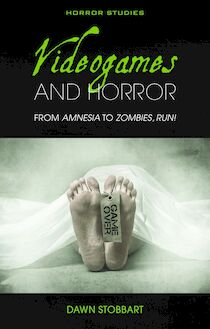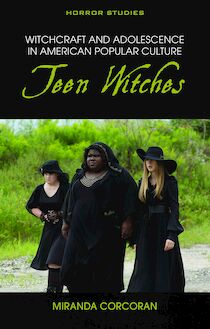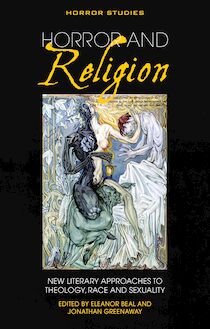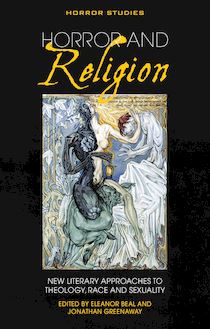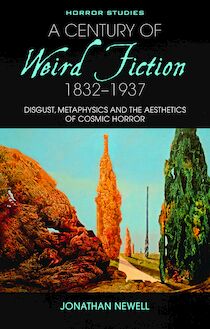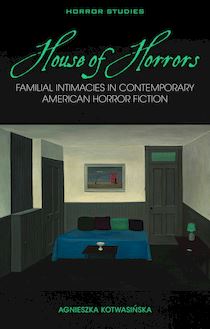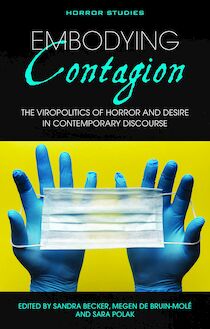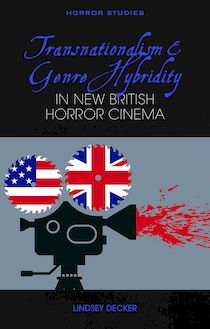-
 Univers
Univers
-
 Ebooks
Ebooks
-
 Livres audio
Livres audio
-
 Presse
Presse
-
 Podcasts
Podcasts
-
 BD
BD
-
 Documents
Documents
-
- Cours
- Révisions
- Ressources pédagogiques
- Sciences de l’éducation
- Manuels scolaires
- Langues
- Travaux de classe
- Annales de BEP
- Etudes supérieures
- Maternelle et primaire
- Fiches de lecture
- Orientation scolaire
- Méthodologie
- Corrigés de devoir
- Annales d’examens et concours
- Annales du bac
- Annales du brevet
- Rapports de stage
La lecture à portée de main
Vous pourrez modifier la taille du texte de cet ouvrage
Découvre YouScribe en t'inscrivant gratuitement
Je m'inscrisDécouvre YouScribe en t'inscrivant gratuitement
Je m'inscrisEn savoir plus
Vous pourrez modifier la taille du texte de cet ouvrage
En savoir plus

Description
This anthology comprises essays that study the form, aesthetics and representations of LGBTQ+ identities in an emerging sub-genre of film and television termed ‘New Queer Horror’. This sub-genre designates horror crafted by directors/producers who identify as gay, bi, queer or transgendered, or works like Jeepers Creepers (2001), Let the Right One In (2008), Hannibal (2013–15), or American Horror Story: Coven (2013–14), which feature homoerotic or explicitly homosexual narratives with ‘out’ LGBTQ+ characters. Unlike other studies, this anthology argues that New Queer Horror projects contemporary anxieties within LGBTQ+ subcultures onto its characters and into its narratives, building upon the previously figurative role of Queer monstrosity in the moving image. New Queer Horror thus highlights the limits of a metaphorical understanding of queerness in the horror film, in an age where its presence has become unambiguous. Ultimately, this anthology aims to show that in recent years New Queer Horror has turned the focus of fear on itself, on its own communities and subcultures.
List of Illustrations
Author Biographies
Introduction
Part 1: TRANSFORMING, RE-READING AND RE-MAKING QUEER HORROR
1: ‘My Brother’s Creeper’: Towards a Queer (Re-)Reading of Victor Salva’s Jeepers Creepers (2001) – John Edgar Browning
2: Queer Cult Performance: Recreating Rocky Horror in the Twenty-First Century – John Lynskey
3: Castrating the Queer Vampire in Let the Right One In (2009) and Let Me In (2010) – Darren Elliott-Smith
4: ‘Becoming Hannibal’: Identification and Transformation in Queer Horror Television – Ben Tyrer
Part 2: QUEER PLAYGROUNDS AND ADOLESCENT HORRORS
5: ‘What happened to my sweet girl?’: Paranoid and Reparative readings of Queer Subjectivity in Black Swan (2010) and Jack and Diane (2012) – Robyn Ollett
6: ‘A Dream Within a Dream’: Children’s ‘Horror’ Television and Lesbianism in the World of Marceline the Vampire Queen – Simon Bacon
7: Abjection, Queer Bodies and Grotesque Doppelgängers in Jack and Diane and The Nature of Nicholas – Fernando Gabriel Pagnoni Berns and Mariana Zárate
8: At the Edges of (queer) Time and Space: Atemporality, Adolescence, and Abjection in Final Destination – Christopher Clark
Part 3: BADASS WITCHES AND QUEER WOLVES
9: ‘If you look in the face of evil, evil’s gonna look right back at you’: Anthologising Supernatural Sexualities on American Horror Story: Coven – Andrew J. Owens.
10: Like and Lycanthropy: The New Pack Werewolf According to Tyler, Tyler and Taylor – Tim Stafford
11: ‘Unspeakable Acts’: Coming Out as Werewolf – Lisa Metherell.
12: ‘Sisters United’: Feminist Nostalgia, Queer Spectatorship, and the Radical Witch Politics of Rob Zombie’s The Lords of Salem – Ben Raphael Sher
Selected Bibliography
Sujets
Informations
| Publié par | University of Wales Press |
| Date de parution | 01 octobre 2020 |
| Nombre de lectures | 0 |
| EAN13 | 9781786836281 |
| Langue | English |
Informations légales : prix de location à la page 0,2850€. Cette information est donnée uniquement à titre indicatif conformément à la législation en vigueur.
Extrait
New QueerHorror
FILM AND TELEVISION
HORROR STUDIES
Series Editor
Xavier Aldana Reyes, Manchester Metropolitan University
Editorial Board
Stacey Abbott, Roehampton University
Linnie Blake, Manchester Metropolitan University
Harry M. Benshoff, University of North Texas
Fred Botting, Kingston University
Steven Bruhm, Western University
Steffen Hantke, Sogang University
Joan Hawkins, Indiana University
Agnieszka Soltysik Monnet, University of Lausanne
Bernice M. Murphy, Trinity College Dublin
Johnny Walker, Northumbria University
Preface
Horror Studies is the first book series exclusively dedicated to the study of the genre in its various manifestations – from fiction to cinema and television, magazines to comics, and extending to other forms of narrative texts such as video games and music. Horror Studies aims to raise the profile of Horror and to further its academic institutionalisation by providing a publishing home for cutting-edge research. As an exciting new venture within the established Cultural Studies and Literary Criticism programme, Horror Studies will expand the field in innovative and student-friendly ways.
New QueerHorror
FILM AND TELEVISION
EDITED BY DARREN ELLIOTT-SMITH AND JOHN EDGAR BROWNING
© The Contributors, 2020
All rights reserved. No part of this book may be reproduced in any material form (including photocopying or storing it in any medium by electronic means and whether or not transiently or incidentally to some other use of this publication) without the written permission of the copyright owner except in accordance with the provisions of the Copyright, Designs and Patents Act. Applications for the copyright owner’s written permission to reproduce any part of this publication should be addressed to the University of Wales Press, University Registry, King Edward VII Avenue, Cathays Park, Cardiff, CF10 3NS.
www.uwp.co.uk
British Library Cataloguing-in-Publication Data
A catalogue record for this book is available from the British Library.
ISBN 978-1-78683-626-7
eISBN 978-1-78683-628-1
The rights of The Contributors to be identified as authors of this work have been asserted in accordance with sections 77 and 79 of the Copyright, Designs and Patents Act 1988.
The publisher has no responsibility for the persistence or accuracy of URLs for any external or third-party internet websites referred to in this book, and does not guarantee that any content on such websites is, or will remain, accurate or appropriate.
Cover image: Travis Falligant, ‘Call me by your nightmare’ (2019), digital illustration © the artist, IBTrav Artworks.
Contents
List of Illustrations
Notes on Contributors
Introduction
Part One: Transforming, Re-Reading and Re-Making Queer Horror
1. ‘My Brother’s Creeper’: Towards a Queer (Re-)Reading of Victor Salva’s Jeepers Creepers (2001) John Edgar Browning
2. Queer Cult Performance: Recreating Rocky Horror in the Twenty-First Century John Lynskey
3. Castrating the Queer Vampire in Let the Right One In (2008) and Let Me In (2010) Darren Elliott-Smith
4. ‘Becoming Hannibal’: Identification and Transformation in Queer Horror Television Ben Tyrer
Part Two: Queer Playgrounds and Adolescent Horrors
5. ‘What Happened to My Sweet Girl?’: Paranoid and Reparative Readings of Queer Subjectivity in Black Swan (2010) and Jack and Diane (2012) Robyn Ollett
6. ‘A Dream Within a Dream’: Children’s ‘Horror’ Television and Lesbianism in the World of Marceline the Vampire Queen Simon Bacon
7. Abjection, Queer Bodies and Grotesque Doppelgängers in Jack and Diane and The Nature of Nicholas Fernando Gabriel Pagnoni Berns and Mariana Zárate
8. At the Edges of (Queer) Time and Space: Atemporality, Adolescence and Abjection in Final Destination Christopher W. Clark
Part Three: Badass Witches and Queer Wolves
9. ‘If You Look in the Face of Evil, Evil’s Gonna Look Right Back at You’: Anthologising Supernatural Sexualities on American Horror Story: Coven Andrew J. Owens
10. Like and Lycanthropy: The New Pack Werewolf According to Tyler, Tyler and Taylor Tim Stafford
11. ‘Unspeakable Acts’: Coming Out as Werewolf Lisa Metherell
12. ‘Sisters United’: Feminist Nostalgia, Queer Spectatorship and the Radical Witch Politics of Rob Zombie’s The Lords of Salem Ben Raphael Sher
Notes
Select Bibliography
List of Illustrations
Figure 1. The Creeper at his craft in Jeepers Creepers (2001) (Metro-Goldwyn-Mayer).
Figure 2. Buffalo Bill at his craft in The Silence of the Lambs (1991) (Orion Pictures Corp.).
Figure 3. Tim Curry (left, 1975) and Laverne Cox (right, 2016) as Dr Frank-N-Furter.
Figure 4. Queer empathy in Let the Right One In (2008).
Figure 5. Eli’s scar in Let the Right One In (2008).
Figure 6. The Stagibal, ‘At the base of every identification lies a murderous wish …’
Figure 7. The desire of man is the desire of the Other (Season 2, Episode 10).
Figure 8. Princess Bubblegum caresses Marceline before she undergoes the ‘procedure’. ‘Marceline the Vampire Queen’, Stakes, Part 1.
Figure 9. Diane’s doppelgänger in Jack and Diane (2012).
Figure 10. Derek Hale in Teen Wolf – Season 2, Episode 10, ‘Fury’ (2012).
Notes on Contributors
Simon Bacon is an Independent Scholar based in Poznan, Poland. He has edited books on various subjects including Undead Memory: Vampires and Human Memory in Popular Culture (2014) and Growing Up with Vampires: Essays on the Undead in Children’s Media (2018), both with Katarzyna Bronk, and edited Gothic: A Reader (2018) and Horror: A Companion (2019). He has published two monographs, Becoming Vampire: Difference and the Vampire in Popular Culture (2016) and Dracula as Absolute Other: The Troubling and Distracting Specter of Stoker’s Vampire on Screen (2019), and his third, Eco-Vampires: The Undead and the Environment , has just been released.
Fernando Gabriel Pagnoni Berns is a Professor at the Universidad de Buenos Aires (UBA) – Facultad de Filosofía y Letras(Argentina). He teaches courses on international horror film. He is director of the research group on horror cinema ‘Grite’ and has published chapters in the books Divine Horror , edited by Cynthia Miller, To See the Saw Movies: Essays on Torture Porn and Post 9/11 Horror , edited by John Wallis, Critical Insights: Alfred Hitchcock , edited by Douglas Cunningham, Gender and Environment in Science Fiction , edited by Christy Tidwell and The Films of Delmer Daves , edited by Matthew Carter, among others. He is currently writing a book about Spanish horror TV series Historias para no Dormir.
John Edgar Browning is Professor of Liberal Arts at the Savannah College of Art and Design (SCAD). He has over a dozen contracted or published books and over seventy-five shorter works that cluster around Dracula, vampires, zombies, horror, monstrosity, Bram Stoker and the Gothic. His works include more recently Speaking of Monsters: A Teratological Anthology (Palgrave, 2012), The Forgotten Writings of Bram Stoker (Palgrave Macmillan, 2012) and Zombie Talk: Culture, History, Politics (Palgrave, 2015), as well as the forthcoming volume Dracula – An Anthology: Critical Reviews and Reactions, 1897–1920 (Edinburgh University Press). He is also co-editing, with David J. Skal, the second Norton Critical Edition of Dracula (forthcoming 2020).
Christopher W. Clark is a Visiting Lecturer in English Literature and Creative Writing at the University of Hertfordshire and an Associate Tutor in American Studies at the University of East Anglia. Their research considers how queerness is depicted across literature and visual cultures to provide a counter-narrative to concepts of transcultural memory, nationalism and citizenry. Previously, they have published articles on the writing of Jesmyn Ward ( Mississippi Quarterly ) and the photography of Nina Berman and Jonathan Hyman ( Journal of American Studies , forthcoming 2020) as well as having reviewed several monographs. They are currently editing a special issue of the Journal of Homosexuality , titled ‘Queer Subjectivities and the Contemporary United States’, forthcoming 2020.
Darren Elliott-Smith is Senior Lecturer in Film and Gender at the University of Stirling. His research focuses on representations of queerness, gender and the body in horror and melodrama film and television and extends to cult and trash cinema and film exhibition, programming and curation and videographic film studies. His monograph Queer Horror Film and Television: Sexuality and Masculinity at the Margins (2016) is published by I.B. Tauris and he has contributed to several edited collections and journals on Queerness, Horror and Melodrama.
John Lynskey is a PhD researcher in Film Studies at the University of Edinburgh in the School of Literatures, Languages and Cultures. He currently holds an MPhil degree in Literatures of the Americas from Trinity College, Dublin, as well as an MA in Film Studies from University College Dublin. He has presented his work at numerous conferences across the United Kingdom, including Cine-Excess and Film-Philosophy, and acted as the co-organiser of Don’t Look: Representations of Horror in the 21st Century Conference in April 2018. His research interests include: cult cinema spectatorship and audience participation, queer audiences, and queer horror and monstrosity.
Lisa Metherell is an artist-researcher and Senior Lecturer at the School of Art, Birmingham City University. She teaches and researches in the areas of Art and Design and queer studies, including non-figurative queer art practice. She is particularly interested in knowledges that might be difficult to grasp.
Robyn Ollett is a NECAH-funded PhD candidate based at Teesside University under the supervision of Dr Rachel Carroll (Teesside), Prof. Ruth Robbins (Leeds Beckett) and Dr Sarah Ilott (MMU). Her thesis is titled ‘Queer Lives through Dead Eyes: Observing the New Queer Gothic’; it interrogates the relationship between queerness and the
-
 Univers
Univers
-
 Ebooks
Ebooks
-
 Livres audio
Livres audio
-
 Presse
Presse
-
 Podcasts
Podcasts
-
 BD
BD
-
 Documents
Documents
-
Jeunesse
-
Littérature
-
Ressources professionnelles
-
Santé et bien-être
-
Savoirs
-
Education
-
Loisirs et hobbies
-
Art, musique et cinéma
-
Actualité et débat de société
-
Jeunesse
-
Littérature
-
Ressources professionnelles
-
Santé et bien-être
-
Savoirs
-
Education
-
Loisirs et hobbies
-
Art, musique et cinéma
-
Actualité et débat de société
-
Actualités
-
Lifestyle
-
Presse jeunesse
-
Presse professionnelle
-
Pratique
-
Presse sportive
-
Presse internationale
-
Culture & Médias
-
Action et Aventures
-
Science-fiction et Fantasy
-
Société
-
Jeunesse
-
Littérature
-
Ressources professionnelles
-
Santé et bien-être
-
Savoirs
-
Education
-
Loisirs et hobbies
-
Art, musique et cinéma
-
Actualité et débat de société
- Cours
- Révisions
- Ressources pédagogiques
- Sciences de l’éducation
- Manuels scolaires
- Langues
- Travaux de classe
- Annales de BEP
- Etudes supérieures
- Maternelle et primaire
- Fiches de lecture
- Orientation scolaire
- Méthodologie
- Corrigés de devoir
- Annales d’examens et concours
- Annales du bac
- Annales du brevet
- Rapports de stage

